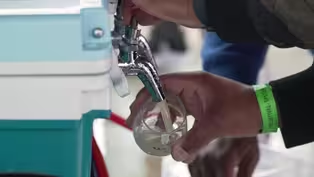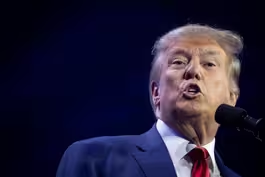
Capehart and Abernathy on Trump’s latest legal troubles
Clip: 7/28/2023 | 12m 31sVideo has Closed Captions
Capehart and Abernathy on Trump’s latest legal troubles and the health of U.S. leadership
Washington Post associate editor Jonathan Capehart and Washington Post contributor Gary Abernathy join Geoff Bennett to discuss the week in politics, including the repercussions of Trump’s latest legal troubles, the rejection of Hunter Biden's plea deal and questions about the age and vulnerability of U.S. leadership.
Problems playing video? | Closed Captioning Feedback
Problems playing video? | Closed Captioning Feedback
Major corporate funding for the PBS News Hour is provided by BDO, BNSF, Consumer Cellular, American Cruise Lines, and Raymond James. Funding for the PBS NewsHour Weekend is provided by...

Capehart and Abernathy on Trump’s latest legal troubles
Clip: 7/28/2023 | 12m 31sVideo has Closed Captions
Washington Post associate editor Jonathan Capehart and Washington Post contributor Gary Abernathy join Geoff Bennett to discuss the week in politics, including the repercussions of Trump’s latest legal troubles, the rejection of Hunter Biden's plea deal and questions about the age and vulnerability of U.S. leadership.
Problems playing video? | Closed Captioning Feedback
How to Watch PBS News Hour
PBS News Hour is available to stream on pbs.org and the free PBS App, available on iPhone, Apple TV, Android TV, Android smartphones, Amazon Fire TV, Amazon Fire Tablet, Roku, Samsung Smart TV, and Vizio.
Providing Support for PBS.org
Learn Moreabout PBS online sponsorshipGEOFF BENNETT: To dive deeper into the repercussions of Donald Trump's latest legal troubles and more, we turn to the analysis tonight of Capehart and Abernathy.
That's Jonathan Capehart, associate editor for The Washington Post, and Gary Abernathy, also a Washington Post contributor.
David Brooks is away.
It's good to see you both.
JONATHAN CAPEHART: Hi, Geoff.
GARY ABERNATHY, The Washington Post: You too.
GEOFF BENNETT: So, special counsel Jack Smith leveled new charges against Donald Trump this past week, including an allegation that Trump and others sought to delete security video of rooms in which boxes of classified documents were kept.
Gary, how do these additional charges change or expand our understanding of GARY ABERNATHY: Well, what's interesting is, when I talked to a lot of Trump supporters today, or several of them about this, they were very disappointed to hear this.
I mean, of all the things in this documents case, the cover-up is going to be the worst.
I mean, this is -- I have questioned whether a lot of these things are going to be or should be pursued, but if they get one of his people to turn on him and say, yes, he told me to cover up this or see if we could delete this footage, that's going to be very bad for him.
Now, his opponents, looking at this politically, need to actually quit resorting to defending him if they want to make any headway against him and start saying, look, this is a cover-up.
As your earlier guest said today on the show, this is evidence of doing something wrong.
Now, having said that, it's an opportunity to separate Trump from his supporters.
But, to do that, Jonathan and Geoff, the DOJ also needs to realize, look, we have got two parallel things going on here, and we can't seem to have a double standard.
Here, you had a week where the president's son was in court trying to do a sweetheart deal, plead to two misdemeanors and, he thought, be exempted or be immunized from any other crimes that he may have committed, whereas, on the other hand the president's probably main opponent for November is -- it's all full barrels, let's keep indicting more and more people around him to get someone to flip and see if they will say, Trump told me to do this.
You have got to not have an excuse for Trump supporters to say, hey, we have got a double standard going on here.
GEOFF BENNETT: Jonathan, how do you see it?
And what do you make of that parallel between... JONATHAN CAPEHART: There's no parallel.
(LAUGHTER) GEOFF BENNETT: OK. JONATHAN CAPEHART: I'm not even going to let you answer the question, Geoff.
There is no parallel between the legal troubles involving the president's son and the mountain of legal problems facing the former president of the United States.
The cover-up that is alleged in the superseding indictment is damning, but so is the original indictment.
We're talking about a former president of the United States who kept classified documents, despite the fact he no longer had legal access to them once he was no longer president of the United States.
And in the initial indictment, we saw how the boxes were being moved around.
What the superseding indictment shows is that "the boss " wanted the tapes destroyed, was moving boxes himself, was even going through the boxes and picking things out and shoving other boxes elsewhere, and then lying to his lawyers.
If Trump supporters are disappointed by the cover-up, that's on them.
What the American people are learning is that the former president of the United States looks even worse now after this superseding indictment than he did with the original indictment, as we're waiting for a possible indictment in the other Jack Smith investigation.
GARY ABERNATHY: And I agree with everything you said about -- there's no excuse for this.
OK?
I have said from the beginning, Trump's his own worst enemy.
Trump should have given these documents back the minute he was asked to give them back.
But there's also -- let's don't pretend there's not a public perception element of this too that's going to be very important to successfully prosecute Trump.
You need more of the public to weigh in and say, this is the right thing to do.
And, to do that, you need the confidence that the DOJ plays it straight down the middle on high-profile cases, both involving the president's likely opponent in November and the president's son.
GEOFF BENNETT: Well, we have a new "PBS NewsHour"/NPR/Marist poll that doesn't ask that question, but asks a similar one.
It looks at how Trump's legal troubles are resonating among the electorate.
And 51 percent of those responding to this poll said that they believe that Trump has done something illegal, 27 percent say that he's done something unethical, but not illegal, and then 19 percent say he's done nothing wrong.
And this poll was conducted, as you see there, between July 24 and July 27.
So, what do you make of those results, Jonathan?
JONATHAN CAPEHART: Well, I take solace in the fact that a majority of the country views what the former president did as illegal.
If you add the 27 percent who think that what he did was unethical, but maybe not illegal, I will take that too.
You add those two together, if my math is right, that's -- my math is wrong that I wrote.
(LAUGHTER) JONATHAN CAPEHART: It's 70 -- it's actually 78 percent of the country thinks he's shady, if you put the two together.
That tells me that the investigations and the impact of what we're learning is having an impact on the way people are viewing the former president, and I think rightly.
The 19 percent who view him as having done nothing wrong, that is not surprising.
That is actually... GARY ABERNATHY: Well, if you take that middle result, though, and group it with the others that say, we don't think it's illegal, you have got a group that says -- about half saying it's not illegal.
They may say it's unethical, but it's not illegal.
JONATHAN CAPEHART: It's not about half.
It's 46 percent.
(CROSSTALK) JONATHAN CAPEHART: So, just less than half.
GARY ABERNATHY: When is 46 percent not about half, Jonathan?
JONATHAN CAPEHART: Well, when 51 percent say that some -- he's done something... GARY ABERNATHY: Fifty-one is bigger than 46.
We will agree on that.
JONATHAN CAPEHART: Exactly.
GEOFF BENNETT: And there's also the margin of error.
So, yes, we will table that for now.
GEOFF BENNETT: But, Gary, what are we to make of Donald Trump's hardwired fixation with Hillary Clinton's e-mail server during the campaign, an e-mail-investigation that ended without charges, the "Lock her up" chants?
It was a call-and-response to -- at all of those rallies.
I was there covering it.
And now fast-forward to the current moment.
Donald Trump is accused of trying to wipe a server that had video footage of the mishandling of document -- of classified documents.
GARY ABERNATHY: So are you saying that perhaps we will get the same result with the Trump case as we got with the Hillary case, which was no charges?
And that's the problem that a lot of the country has with what they see.
That's why they bring up Hillary Clinton.
Hillary Clinton, very similar situation, as you point out, no charges.
No reasonable prosecutor would bring charges was the famous quote from FBI Director James Comey.
A lot of people just have never bought that.
And so they're going to question, OK, why is Trump being treated differently?
JONATHAN CAPEHART: Donald Trump is being treated differently because he had classified documents that were about nuclear secrets, preparedness of America's allies.
And to your original question, Geoff, if we have learned anything from the four years of Donald Trump's presidency and his campaign leading up to it and the campaign to try to get reelected, he's the master of projection.
Anything that he accuses someone else of doing, whether it's Hillary Clinton, Barack Obama, you name them, he has either done it himself for real or would really like to do it.
And what we're discovering now is that he has done all of the things he has accused Hillary Clinton of doing, actually done.
The e-mails that they found on Secretary Clinton's server, a lot of them had to do with cooking recipes and appointments.
None had to do with nuclear secrets and secrets about our allies.
And you just can't -- there's no parallel.
There is no symmetry.
There is no similarity at all.
GARY ABERNATHY: Well, actually, Director Comey pointed out that a lot of her things that they found on her server were classified and probably were accessed by foreign agents.
I mean, this is something they said probably happened.
So we don't know if they were nuclear secrets.
Of course, we don't know about all the ones that were deleted before anyone ever got to see them.
JONATHAN CAPEHART: If they were nuclear secrets, Gary, we would have known.
Donald Trump's DOJ?
Come on.
GEOFF BENNETT: Well, in the time that remains, I want to talk about something else that happened this past week.
And that was the Senate minority leader, Mitch McConnell.
He was giving a press conference, and he suddenly stopped speaking.
It was difficult to watch.
He stopped speaking for about 19 seconds.
And he -- as you see there, one of the senators to his left stepped in, and he was walked away.
Later, an aide said that he was feeling lightheaded.
And then yesterday, Senator Dianne Feinstein appeared confused during a vote on a defense bill, prompting a fellow Democrat to step in.
WOMAN: Just say aye.
SEN. DIANNE FEINSTEIN (D-CA): OK, just -- aye.
GEOFF BENNETT: What are we to make of the gerontocracy that runs Washington, Gary?
GARY ABERNATHY: Yes, I think it's concerning.
It plays to why people have these concerns to begin with.
It plays to why a lot of people aren't happy about having a couple of people around the age of 80 probably going to be running for president against each other.
But the Mitch McConnell thing was disturbing to watch.
It was uncomfortable for everybody.
It makes you really say, we hope he's OK. We say a little prayer for him and hope that his health is really OK.
But it raises disturbing questions.
There's no way to come back, as they tried to do, and kind of whitewash it a little bit and say, he's fine.
He's clearly not fine.
GEOFF BENNETT: Well, the Republican leader says he's going to serve out the remainder of his term.
It's another 17 months.
And we should say that Senator Feinstein's office said that that was a very chaotic, their word, markup session, a business meeting of that committee, and that she wasn't fully aware of what was happening when.
How do you see it?
JONATHAN CAPEHART: Well, this is the difference between the health conversation and age conversation we're having on the -- at the presidential level and the conversation that we're having now because of what happened between -- with Senators Feinstein and McConnell.
They have been -- they have demonstrable and reported health difficulties.
And for them to hang on for so long is what's giving certainly Democrats agita and Republicans a lot of concern.
I do think that what's happening with them is going to lead to a conversation that I think we should have in the country about, how long is too long?
How old is too old?
And then, if you want to serve even longer, beyond the age of 75 or 77, what are the things you have to do to demonstrate to the American people that you should be entrusted with an elected position?
How much more transparent must you be or should you be if you want to serve beyond a certain age?
I think those are reasonable questions to debate.
GEOFF BENNETT: What about that, Gary?
Because, as you both know, seniority accounts for a lot in Congress.
You get plum committee assignments, fund-raising.
There are prerogatives and positions that come with continuous terms, I mean, over decades.
GARY ABERNATHY: Yes.
Yes.
Well, that's true.
GEOFF BENNETT: Do term limits make sense?
GARY ABERNATHY: Yes, I have never been a fan of term limits, and even though Republicans are the ones that pushed them over the years, by and large.
I think they're -- they -- when people complain about the deep state and leaving the bureaucrats in control of things, that's what's going to happen when you have term limits and people have to come and go and only the bureaucrats get to stay.
But I don't like an age limit.
I don't like saying 80 is the age or 75 is the age.
But I do think some cognitive testing or something like that is not unreasonable, especially when you see what we have seen today.
JONATHAN CAPEHART: The key thing you lose with term limits is expertise.
That is the key thing.
GEOFF BENNETT: That's true.
Jonathan Capehart and Gary Abernathy, great to see you all -- both.
Have a good weekend.
JONATHAN CAPEHART: Thanks, Geoff.
GARY ABERNATHY: You too.
Thank you.
GEOFF BENNETT: Take care.
Activist describes how China targets critics in exile
Video has Closed Captions
Clip: 7/28/2023 | 7m 15s | Hong Kong democracy activist describes how Chinese government targets critics in exile (7m 15s)
Black-owned brewery breaking barriers and creating change
Video has Closed Captions
Clip: 7/28/2023 | 4m 57s | Black-owned brewery breaking barriers and creating change in their community (4m 57s)
Breaking down Trump's new charges in documents case
Video has Closed Captions
Clip: 7/28/2023 | 5m 58s | Former U.S. attorney breaks down new charges against Trump in classified documents case (5m 58s)
How prescription drug supply chain harms local pharmacies
Video has Closed Captions
Clip: 7/28/2023 | 8m 56s | How the prescription drug supply chain is killing local pharmacies (8m 56s)
The legal pitfalls domestic violence victims face
Video has Closed Captions
Clip: 7/28/2023 | 8m 25s | The legal pitfalls domestic violence victims face when they defend themselves (8m 25s)
Providing Support for PBS.org
Learn Moreabout PBS online sponsorship
- News and Public Affairs

FRONTLINE is investigative journalism that questions, explains and changes our world.

- News and Public Affairs

Amanpour and Company features conversations with leaders and decision makers.












Support for PBS provided by:
Major corporate funding for the PBS News Hour is provided by BDO, BNSF, Consumer Cellular, American Cruise Lines, and Raymond James. Funding for the PBS NewsHour Weekend is provided by...




